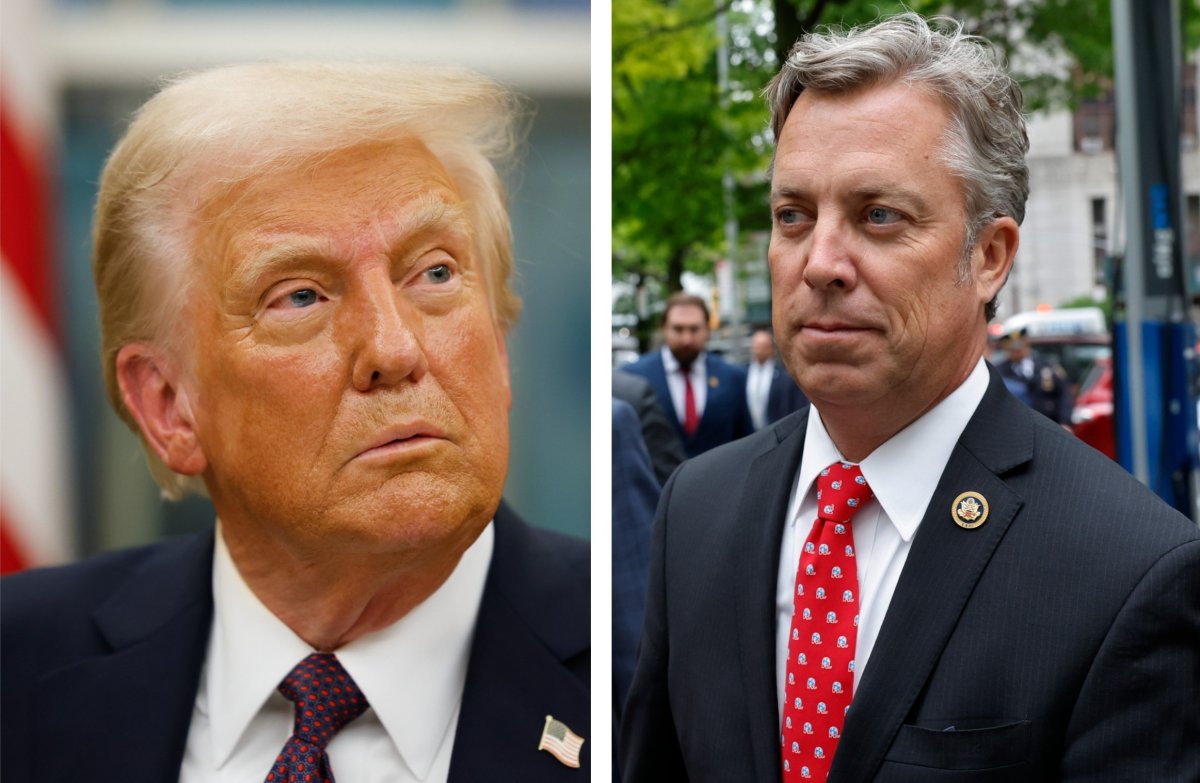Republican Tennessee Representative Andy Ogles has proposed changing the Constitution to allow President Donald Trump to serve a third term in office—a move that is unlikely to succeed.
Newsweek has contacted the White House and Ogles for comment via email.
Why It Matters
Democratic figures have previously warned that Trump could rule as an authoritarian if he returns to the White House. The president has already signed an executive order that would largely prevent birthright citizenship, despite it being guaranteed by the Constitution's 14th Amendment.

What to Know
Ogles introduced a House joint resolution on Thursday to amend part of the Constitution that prevents a president from being elected more than twice.
Ogles suggests that the 22nd Amendment be altered to state that no person shall be elected to the office of president more than three times, nor serve any additional term after serving two consecutive terms.
The amendment would prevent previous consecutive two-term presidents, such as Barack Obama or George W. Bush, from running for a third term.
Trump will be 82 by the end of his second term and will have overtaken Joe Biden as the oldest sitting U.S. president in history. A third term would potentially see Trump in office until age 86.
What Is the 22nd Amendment?
The 22nd Amendment of the Constitution was ratified in 1951 following the presidency of Franklin D. Roosevelt, who was elected to four terms between 1933 and 1945. The two-term limit for presidents was put forward by Congress to prevent potential abuses of power.
Section I of the 22nd Amendment states: "No person shall be elected to the office of the President more than twice, and no person who has held the office of President, or acted as President, for more than two years of a term to which some other person was elected President shall be elected to the office of the President more than once. But this Article shall not apply to any person holding the office of President when this Article was proposed by the Congress, and shall not prevent any person who may be holding the office of President, or acting as President, during the term within which this Article becomes operative from holding the office of President or acting as President during the remainder of such term."
The wording of the amendment means that a vice president who ascends to the presidency through succession, such as if the incumbent dies or resigns, could seek two additional terms if their initial presidency lasted less than two years.
Why Is Andy Ogles Proposing Changing the 22nd Amendment?
In a statement on Thursday, Ogles said Trump has proven himself to be the "only figure in modern history capable of reversing our nation's decay and restoring America to greatness," and therefore must have the necessary time to accomplish these goals.
The MAGA loyalist said changing the 22nd Amendment would ensure the country keeps the "bold leadership our nation so desperately needs."
Could Donald Trump Actually Serve a Third Term?
Any proposed amendment to the Constitution must be passed by a two-thirds majority vote in both the House and Senate and then ratified by at least 38 of the 50 U.S. states.
Ogles' move to allow Trump to run for a third term in office is highly unlikely to receive the bipartisan support needed to be implemented.
The Constitution has been amended 27 times since it was written in 1787. The most recent amendment was in 1992, preventing members of Congress from granting themselves pay raises during a current session.
What Has Donald Trump Said About It?
Trump has floated the idea of running for a third term, although sometimes seemingly in jest. Trump suggested to House Republicans on November 13 that he would not run again in 2028 "unless you do something." Republicans at the meeting assured reporters that the then-president-elect was joking.
In an April 2024 interview with Time, Trump said would be against of repealing the 22nd Amendment.
"I wouldn't be in favor of a challenge. Not for me. I wouldn't be in favor of it at all. I intend to serve four years and do a great job. And I want to bring our country back. I want to put it back on the right track," Trump said.
What Have Democrats Said About the Proposal?
New York Representative Dan Goldman told Newsweek: "By now, Donald Trump's pattern is predictable: 'joke' about something unconstitutional or authoritarian; normalize the 'joke'; allow sycophantic Republicans to adopt the 'joke' as a serious idea until it becomes MAGA orthodoxy. Rep. Ogles has followed the playbook perfectly by proposing a constitutional amendment to allow Trump to serve a third term. While I'm grateful that he acknowledges that a third term would require a constitutional amendment, nothing Donald Trump says or does is funny."
Harry Sisson, who previously worked with the Biden administration to promote the former president's 2024 campaign online, posted on X, formerly Twitter: "When MAGA said they wanted Trump to be a king, they weren't kidding. Utter insanity."
Representative Steve Cohen of Tennessee told Axios: "Two terms is enough chaos for any nation to endure."
What Other People Are Saying
Representative Andy Ogles said in a statement: "President Trump's decisive leadership stands in stark contrast to the chaos, suffering, and economic decline Americans have endured over the past four years. He has proven himself to be the only figure in modern history capable of reversing our nation's decay and restoring America to greatness, and he must be given the time necessary to accomplish that goal. To that end, I am proposing an amendment to the Constitution to revise the limitations imposed by the 22nd Amendment on presidential terms. This amendment would allow President Trump to serve three terms, ensuring that we can sustain the bold leadership our nation so desperately needs."
Josh Blackman, a constitutional law professor at the South Texas College of Law Houston, told Newsweek in December: "It is true that the text does not address whether a third term can be non-consecutive. This amendment was ratified in the 20th century, and I am not aware of anything in drafting or ratifying history suggesting a third, non-consecutive term would be permitted."
What Happens Next
Ogles' proposal is highly unlikely to progress any further.




















 English (US) ·
English (US) ·